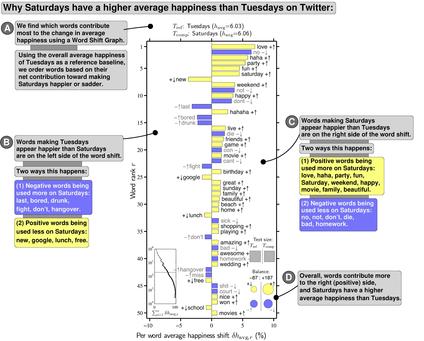And other happiness markers measured by hedonometer
Love, haha, party, and fun are some of the most positive—happy—words in the twittersphere, according to UVM researchers who have tapped the global beat on happiness through tweets. In their hedonometer (hedonometer.org), a team of scientists from the University of Vermont and The MITRE Corporation have created a happiness sensor—or app—that checks the happiness of tweets in English. [follow us on twitter @dailyhap]
“What it’s doing right now is measuring Twitter, checking the happiness of tweets in English,” says Chris Danforth, a UVM mathematician who co-led the creation of the site with fellow mathematician Peter Dodds. But soon the hedonometer will be drawing in other data streams, like Google Trends, the New York Times, blogs, CNN transcripts, and text captured by the link-shortening service bit.ly. And it will be data-mining in twelve languages.
According to the site’s FAQ, the name comes from the economist Francis Edgeworth, who coined the term hedonometer in the late 1800s to describe “an ideally perfect instrument, a psychophysical machine, continually registering the height of pleasure experienced by an individual.”
The hedonometer draws on what scientists call the “psychological valence” of about 10,000 words. Paid volunteers, using Amazon’s Mechanical Turk service, rated these words for their “emotional temperature,” says Dodds. The volunteers ranked words they perceived as the happiest near the top of a 1-9 scale; sad words near the bottom. Averaging the volunteers’ responses, each word received a score: “happy” itself ranked 8.30, “hahaha” 7.94, “cherry” 7.04, and the more-neutral “pancake” 6.96. Truly neutral words, “and” and “the” scored 5.22 and 4.98. At the bottom, “crash” 2.60, the emoticon “:(” 2.36, “war” 1.80, and “jail” 1.76.
Dodds describes the sensor as a big bucket where all the words are tossed before calculating the bucket’s average happiness score. He notes, “Any word or expression can be used in different ways. There’s too much variability in individual expression,” to use this approach in smaller sample sizes. Which explains why in general, Saturdays are measured as happier than Tuesdays—the average American is having “fun”.
We’ve written about the scientification of happiness before, and love Danforth’s assessment of the intent of the project: “We’re not trying to tell you that contentment is better than happiness—we’re not trying to define the word. We’re just saying we’re measuring something important and interesting. And, now, sharing it with the world.”

